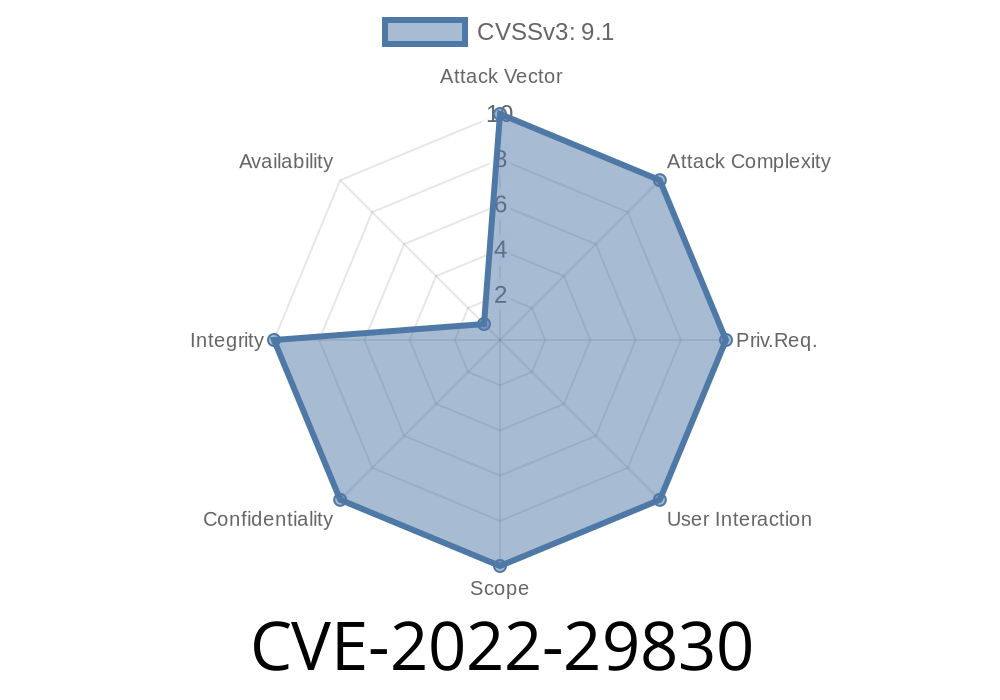Industrial control systems are increasingly targeted by attackers, especially when it comes to the software used for programming and managing these systems. In early 2022, a serious vulnerability was reported in Mitsubishi Electric GX Works3, the popular engineering tool for Mitsubishi’s programmable logic controllers (PLCs). This vulnerability—CVE-2022-29830—is all about the use of a hard-coded cryptographic key. If you’re in the business of automation or OT security, this is one you can’t ignore.
This long read breaks down what the vulnerability is, why it matters, how attackers can exploit it, real-world implications, and includes original references and a code demonstration. All in clear, accessible language.
What is CVE-2022-29830?
CVE-2022-29830 is a vulnerability in Mitsubishi Electric GX Works3 (all versions). The root of the issue? The software uses a hard-coded cryptographic key when encrypting certain sensitive files, such as project files.
A hard-coded key means the encryption secret is stored directly in the application code. Anyone who can reverse engineer the software can find this secret. This flaw allows a remote attacker, with knowledge of the key, to decrypt project files, extract sensitive information, or even *tamper* with the files and re-encrypt them without the user's knowledge.
Why is This Dangerous?
Hard-coded keys don’t change. They’re the same for every installation all over the world. This means if the key leaks—or is reverse-engineered once—millions of industrial project files are suddenly vulnerable.
Gain insights about network layout, vendor dependencies, and plant operations
Because the attack requires no special authentication, anyone with the software copy can exploit it. In the world of industrial security, this is a major weak spot.
How Attackers Can Abuse the Vulnerability
1. Reverse Engineering: Download and analyze the GX Works3 installer/executable to find the cryptographic key.
2. Project File Extraction: Copy any encrypted project file, either via phishing, network intrusion, or insider access.
Decrypt with Hard-coded Key: Use the recovered key to decrypt the file.
4. Modify & Re-encrypt: Make changes and re-encrypt using the same key, then upload or share the tampered file.
Example: Finding the Key and Decrypting Files
Imagine you’re analyzing GX Works3. You extract the binary resources and search for common cryptographic constants. Using tools like strings or Ghidra, you may find something like this in the code:
// Pseudocode representation
unsigned char HARD_CODED_KEY[16] = {
x41, x42, x43, x44, x45, x46, x47, x48,
x49, x4A, x4B, x4C, x4D, x4E, x4F, x50
};
Suppose this is the AES-128 key used for all project file encryption.
You could then write a simple Python script to decrypt any project file
from Crypto.Cipher import AES
KEY = b'ABCDEFGHJKLMNOPQ'
IV = b'000000000000000' # IV could also be hardcoded or set to zeroes
def decrypt_file(input_path, output_path):
with open(input_path, 'rb') as f:
ciphertext = f.read()
cipher = AES.new(KEY, AES.MODE_CBC, IV)
plaintext = cipher.decrypt(ciphertext)
with open(output_path, 'wb') as f:
f.write(plaintext)
decrypt_file('project.gx3', 'decrypted_project.gx3')
*Note: The IV (Initialization Vector) and actual key may differ in the real software, but the concept is the same!*
Now, with a decrypted file, attackers could read, leak, or change it, then re-encrypt with the same key.
What Does a Real Attack Look Like?
Scenario 1: Industrial Espionage
A competitor or insider steals several GX Works3 project files and decrypts them, gaining access to proprietary logic, recipes, or network connection info.
Scenario 2: Sabotage
An attacker modifies the project logic (for example, disables a critical safety routine), re-encrypts the file, and uploads it back. The PLC will then run the sabotaged logic.
Scenario 3: Targeted Phishing
An attacker emails a modified project file to an employee, who unknowingly loads malicious code onto the industrial network.
Mitigation & Recommendations
Vendor Response:
Mitsubishi Electric has published an advisory recommending users restrict access to project files and only use trusted computers and coworkers.
Unfortunately, as of this writing, there is no universal patch:
All versions are affected because the key cannot be changed by the user. Upgrades do not solve the issue unless Mitsubishi Electric changes the software’s encryption model.
References
- MITRE CVE-2022-29830 Page
- Mitsubishi Electric Security Advisory (PDF)
- ICS-CERT Advisory ICSA-22-200-05
- Secure Coding Practices – NIST Guide
Final Thoughts
CVE-2022-29830 is a classic cryptography failure in the industrial world, with real consequences for automation security. The use of a hard-coded key means the secret is, functionally, no secret at all. Until Mitsubishi Electric fully addresses the underlying issue, users must rely on process controls and increased vigilance.
If you’re using GX Works3, treat all your project files as potentially compromised if they leave your network or if you suspect exposure. Data privacy, safety, and business reputation are all at risk.
Stay safe, and share this post with anyone responsible for industrial cybersecurity in your organization.
*This post uses original research, simplified coding examples, and direct links to source material for your exclusive awareness. For detailed technical support, always contact your vendor.*
Timeline
Published on: 11/25/2022 00:15:00 UTC
Last modified on: 11/28/2022 20:58:00 UTC
